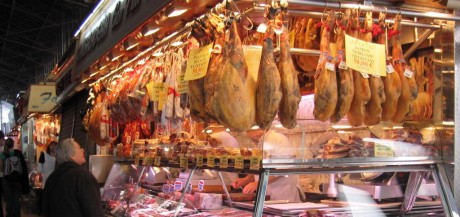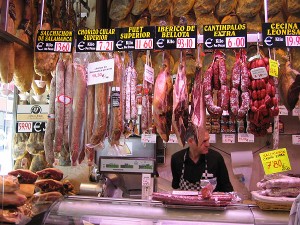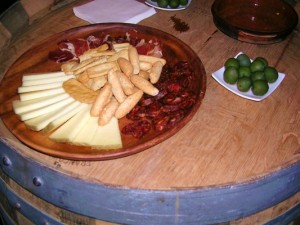Dinner time in Spain is quite surprisingly late. Most restaurants do not open for service until 9PM with peak eating hours running from 10PM to Midnight. In Spain the afternoon “siesta” is very much alive. Spaniards are on a schedule all there own. They get started late in the morning, have lunch around 2PM and then a siesta before 6PM followed by dinner at 10PM. After dinner the city is alive with dancing and music in the streets. One thing that I found to be certain for every dinner is the service of Jaman (spanish ham), Manchengo (spanish cheese) and assorted olives served with crackers. Every night I was in Spain these items were offered to me before ordering much like our restaurants bring bread and butter or salsa and chips before dinner.
There is a quality scale associated with the Jamon. There are four varieties and prices reflect quality. The best jamon is called Jamón Iberico de Bellota - these black pigs are free-range, acorn-fed, Iberians. When walking the streets of Madrid you will pass many, many delicatessens selling Jamon hanging in wraps. The Jamon is sold as an entire leg or shoulder and there are special cutting boards and knives used to shave off thin layers of the ham for serving.
Manchengo cheese is also a favorite among Spaniards. This cheese is made in the La Mancha region of Spain from the milk of sheep of the Manchenga breed and is aged for between 60 days and two years.
Manchego has a variety of different flavors depending on its age. There are three versions of maturity sold:
- Fresco – the fresh cheese is aged for only 2 weeks, with a rich but mild flavor. Produced in small quantities, it is rarely found outside Spain.
- Curado is a semi-firm cheese aged for three to six months with a sweet and nutty flavour.
- Viejo, aged for one year is firm with a sharper flavor the longer it is aged and a rich deep pepperiness to it. It grates well but can also be eaten on its own or as tapas


